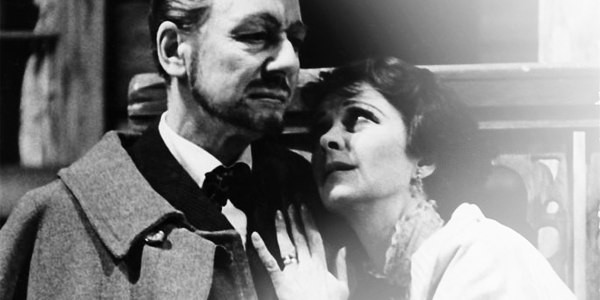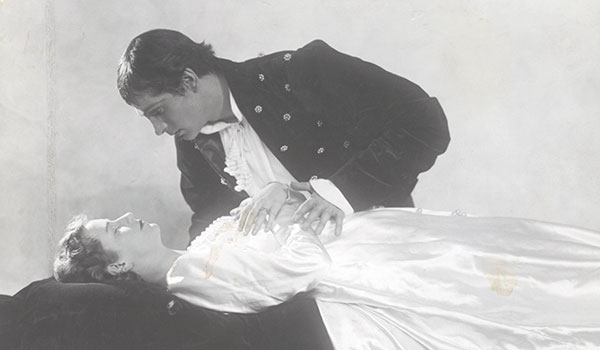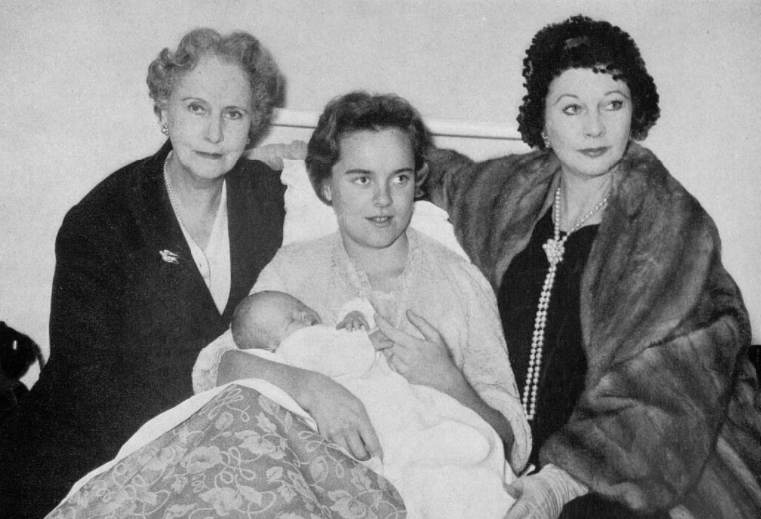In 1966, Elaine Dundy (ex-wife of Kenneth Tynan) interviewed Vivien Leigh backstage at the National Theatre in Washington DC during the run of Ivanov. The article, in which Dundy describes being snubbed by a curiously closed-off Vivien, ran in The Village Voice. This is the companion piece to the previously unpublished interview by Richard F. Mason. It is interesting to look at them side-by-side as it shows either two critics with very different attitudes about the subject, or two very different Viviens. Thanks once again to Peter Coyne for submitting it to the site.
Vivien Leigh: On Interviewing a Star On a Wet Washington Day
by Elaine Dundy
The Village Voice, 1966
It has always been true that physical beauty in stage actresses is an obstacle rather than an asset. Of Kim Stanley, Geraldine Page, or Julie Harris, we may say that their faces have a beauty–“have a strange beauty,” of course, is the way we put it – but beautiful faces they have not. Vivien Leigh almost alone is the exception: the Great Beauty that hasn’t been virtually chased off the stage and onto the screen because of it. From her stage debut in 1935 in “TheMask of Virtue”–which the New York Times commemorated as: “Gains Fame Overnight. Within a few hours after her successful debut, Vivien Leigh received offers from five film companies” etc. etc.–her face has been her fortune which she has chosen to divide equally between the stage and the cinema. And yet, even on the screen Great Beauties are not allowed just to be. Marilyn Monroe transformed herself into a comedienne; Miss Leigh into ah–a ca–um–, into an Adventuress.
It is interesting to note that the part in which she first created such a sensation was that of an “immoral little Parisienne in the 1760s” and that she would go on to triumph as a lady spy in “Dark Journey,” as “That Hamilton Woman,” as Cleopatra in “Caesar and Cleopatra,” and, of course, as Scarlett O’Hara. In other words it was as an adventuress that she succeeded so spectacularly.
And then there is her off-stage personality which reads no less lively than the lives of these above ladies. One remembers her spectacular love-affair with Sir Laurence Olivier culminating in marriage, ending in divorce. One remembers the time, for instance, in 1959, when she was thrown out of the House of Lords’ Gallery for shouting, “I protest against the St. James Theatre being demolished,” only to turn up again two weeks later at the Houses of Parliament sporting a black eye-patch (an insect had bitten her, she explained) as the head of a delegation to see the Minister of Housing about the same issue. A woman, one sensed, of strong feelings; of strong viewpoints. Indeed it has sometimes seemed to me watching her on stage that the woman is more fascinating than the actress; that her roles may be said to be in hopeless competition with her personality.
After She Dies
When informed in Washington where she was then playing in “Ivanov” that I would like to interview Miss Leigh, I was told she would be “delighted” to see me and that a ticket would be left for me and would I please come backstage to see her after she died (she dies before the play is over) because she “got so bored waiting in her dressing room for the final curtain.” We could begin our chat then–though, it was added, if I preferred to stay till the end of the play she would see me afterward.
Boarding the afternoon plane to Washington, I told myself how much I was looking forward to our conversation. Was she not of all actresses the most lively, the most outspoken, the most cultivated, the most interesting? No stranger to trouble, surviving both triumphs and disasters,would she not–considering her life–have the most to say?
What follows now is the Snub Interview. I believe it is A New Art Form. I suppose it could becalled the Non-Interview. After the non-novel, the non-painting, and the non-play, perhaps we are ready for it but I prefer the Snub Interview as this is the first time in my knowledge that the Interviewer doesn’t emerge as the bosom buddy of the interviewed, the sole receptacle of his every confidence. We have already had a few unconscious examples of this: the Englishman actually tripping backward down the stairs as Hemingway shows him out; Sir Osbert Sitwell so often finding Ronald Firbank too shy to see him when he came calling. But this, I think, is the first conscious attempt at the form.
I and my overnight suitcase had arrived at Washington’s National Theatre in a downpour (I am to be spared nothing), where I then proceeded to dry out self and gear, pick up my ticket, and settle down to watching the play. What with “Ivanov,” Chekov, John Gielgud, Ronald Culver, Ethel Griffies, and so forth, I was in pretty much of a what-happened-next-on-stage mood after Miss Leigh dropped dead but, paying her the compliment of strict obedience to her instructions, I duly collected my gear, stumbled over the feet in the eighth row, and wended my way backstage to her dressing room.
Cat Claws
I have often promised myself that were I ever to write about Miss Leigh I would not metamorphose her into a cat. It is a promise that never could be kept. She has a cat face (pointed at the tips), a cat grace, a cat jumpiness, a cat insolence, cat eyes, and cat claws. She is superbly skillful at executing catnips and cat tantrums–or catrums. She is saucy, pert, and imperious. Sir Laurence called her “Puss.” I can well imagine her spanning the whole kingdom of cathood within a week as if, say, on the Monday she were to be a playful little kitten and by the weekend a full-grown tigress.
Of the specific details of her beauty this particular night I can say very little. Seated in front ofher dressing room mirror, her most frequent gesture was that of bending her head and covering her face with her hands. As the role she plays consists of five short scenes, I can only conclude that it was not from weariness that she inclined thus.
“Don’t come near me!” she cries out as I advance into the dressing room. “I’ve got a cold.” (I mention this as the most gracious thing she will say to me in the next 20 minutes.)
I plonk my overnight gear on the floor and myself on a chair opposite and say: I thought perhaps we could chat a little now and then have dinner and have a proper interview tomorrow.
“No. I’m busy tonight and tomorrow’s a matinee.” Could you see me in the morning?
“No.” Oh well, better start right in. What art form moves you most?
“Painting. I am always moved by paintings.” Any one in particular?
“No. No one in particular.” Have you, for instance, made any discovery this year of a painter you particularly like?
“No. I don’t think so.” If you hadn’t been an actress what would you have been?
“Nothing.” Whom do you admire in the world not connected with the theatre?
“Churchill, Kennedy, Schweitzer.” (Whee!) Are you interested in politics?
“Not as much as I should be.” Who are your closest friends?
“I don’t like to name drop and besides I might leave someone out.” (I am disappointed. I was waiting for her to say her mother.) I loved you in “Ship of Fools.” You made every line–every word–tell.
“No, it wasn’t right. There’s much more humor in the part than I got out of it.” (Pause) “I loved that piece you wrote about Barbra Streisand.”
I have never written about Barbra Streisand in my life.
Miss Leigh’s hands fall from her face. Our eyes meet in the dressing room mirror. She looks at me squarely, as if to dispute this last statement but then suddenly, she smiles. It is a little piece of perfection, the smile–all the more perfect for having been rudely forced. It is the slow smile, in two parts. First, to herself: head lowered, the corners of her mouth protestingly release themselves from her will and begin to curl. Then, for the second part, she raises her eyes and a wide sunburst smile beginning wickedly and ending with an almost seraphic sweetness transforms her face, bringing color to her cheeks and sparkle to her eyes; a famous warming professional smile that includes you. Then it vanishes. And the interview continues.
What do you want to do that you haven’t done?
“Travel. Japan, China, Russia.” (Desperately): What is your favorite food?
“Anything that’s well cooked. Raw vegetables.” I see by your clippings that you played Jenny Mere in Max Beerbohm’s “Happy Hypocrite.” What was he like?
“I don’t know. He wasn’t around very much.” What is the pleasantest thing you do?
“I don’t know.” What do you do when not working?
“I like gardening.” What has life taught you.
“Patience,” she says, drumming her fingers on the dressing room table. “And tolerance…” (Her head goes back into her hands at this point and the rest is lost in a mumble.)
It is 25 minutes till midnight. Can I get back to New York? A night in a Washington hotel yawns hideously before me. I collect my gear and stumble out.
I hear myself at the stage door asking the doorman if I’d missed “the last plane to Paris–I mean
to London–I mean–” In the rain a taxi draws up. “Can I catch the last plane to New York?” I gasp.
“You won’t catch it standing there,” says the driver. And it is not until I am safely inside it that I find myself laughing.




Thanks for posting this, Kendra. Elaine herself had rather a colorful life. She had actually divorced Tynan by this time, according to her entry on Wikipedia:
“When she became successful Tynan disapproved of Dundy writing, despite having forecast this success,[4] because it distracted attention from himself, though Dundy herself had seen it as a means to save their marriage. Around this time Tynan started to insist on flagellating his wife, with the threat of his own suicide if she refused.[1] Unsurprisingly, drugs, alcohol, and extramarital affairs by both parties, resulted in the marriage, originally happy, becoming fraught and the marriage was dissolved in 1964. ”
http://en.wikipedia.org/wiki/Elaine_Dundy
Kenneth Tynan and Vivien were friendly after her divorce from Olivier, from the evidence I’ve seen. There was a photo from the early 1960s that turned up in Vanity Fair in the mid-1980s that showed her at table in a New York supper club setting with Tynan and Lillian Hellman (with Vivien looking as though she realized she was the only camera-worthy subject in the group); Tynan gave her very nice notices for Tovarich on stage and for Ship of Fools on screen, and he supposedly told Roman Polanski, rather belatedly, that Vivien had been the most effective Lady Macbeth he had every seen (I think the John Russell Taylor book on Vivien is the source of that observation). Tynan himself was lucky with his second marriage, as his widow, Kathleen Tynan, wrote a good biography after his death. She was also the screenwriter for the film Agatha, with Vanessa Redgrave and Dustin Hoffman.
So was Dundy “friend” or “foe” where Vivien was concerned? Perhaps Vivien’s next biographer will address that question!
Oh, thanks for catching that.
I don’t see why she bothered letting him into her good graces. He was such a tit.
Strange coincidence: today is the anniversary of Tynan’s birth. Maybe it would be better to say he was “such a Peacock!”
‘The writer Paul Johnson, who was “an awestruck freshman-witness to his arrival at the Magdalen lodge” described Tynan as a “tall, beautiful, epicene youth, with pale yellow locks, Beardsley cheekbones, fashionable stammer, plum-coloured suit, lavender tie and ruby signet-ring.” Unlike Johnson and Tynan, most undergraduates at the university had been through World War II, but were nevertheless “struck speechless” by Tynan’s extravagant style.[1]’
http://en.wikipedia.org/wiki/Kenneth_Tynan
The description there of the Tynan/Dundy marriage makes an evening of fun and games with George and Martha seem an exercise in child’s play by Edward Albee. “Who’s Afraid of Elaine Dundy, Elaine Dundy, Elaine Dundy?”
No matter what, Tynan had a way with words, and he was justly proud of his prose. Vivien no doubt appreciated that talent, at least when he wasn’t attacking her.
Paul Johnson had rather a romantic view of Tynan. I always thought he looked a bit like a rat.
I couldn’t agree more Kendra. After all, Larry did say Tynan was responsible for at least one of Vivien’s breakdowns. Also, I didn’t really like Tynan and Dundy referring to Vivien as “catlike”. I happen to like cats
and really dislike their snide comments. Dundy’s remark that even Larry called Viv “Puss” was as we know way off base. We all know that was a term of endearment. I now wonder how much of a “friend” Elaine was to Vivien.
It’s strange, because I showed some of my classmates the Living Famously and Oliviers in Love documentaries about a week ago, and I suddenly realized I don’t really like them as much as I did when i first saw them. It wasn’t the content, per-se, it’s just that I got the sudden sense that quite a few of the people giving commentary on those docs (Elaine Dundy being one) were totally inflating their role in the Oliviers’ lives. It’s like Roy Moseley on the A&E Vivien biography, claiming he was so close with Vivien and everything. Please. It’s always the hangers-on who give nitty gritty details about their problems and everything. Their close friends (Gielgud, Mills, etc) never did that.
I couldn’t agree more.I felt that way when I read a biography on Larry by Thomas Kiernan. This guy only met Larry on a few occasions, but claimed Larry revealed to him he was molested by a priest when he was a youth, that this accounted for his being “bisexual”. Amazing how the author can draw this conclusion only meeting Larry a few times! Knowing Larry he may have put on a big “act” just to amuse himself!